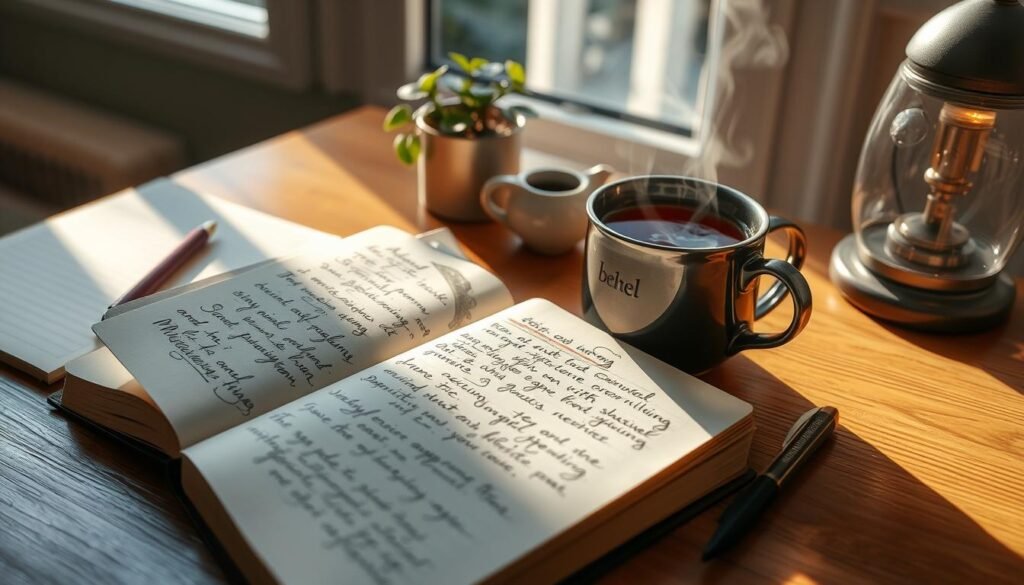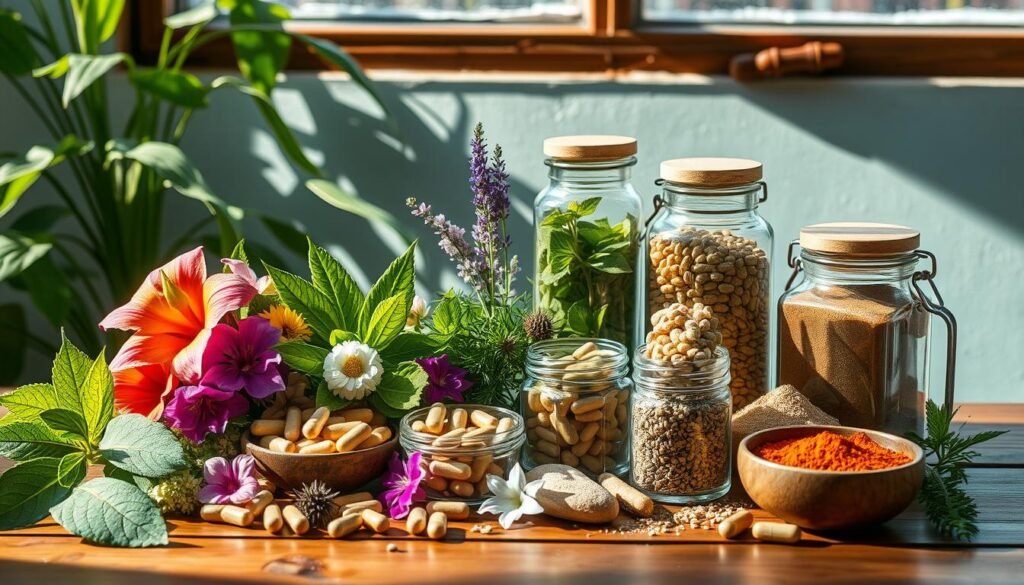Did you know over 19% of adults in the U.S. feel anxious each year? This big number shows a common health issue people deal with every day. Looking into natural ways to ease anxiety can help folks find effective methods to better their lives. Recently, more people are looking into whole-body solutions for anxiety. They want to know the best natural options for calming their worries. This article talks about different ideas, like exercise and smelling soothing oils. It gives you tips on beating anxiety in a natural way.
Key Takeaways
- Anxiety affects over 19% of adults in the U.S. yearly.
- Natural remedies can effectively alleviate anxiety symptoms.
- Physical activity is associated with a significant reduction in anxiety.
- Meditation and mindfulness have been shown to help in managing anxiety.
- Methods like journaling can improve overall mental well-being.
- Understanding the impact of diet and supplements aids in anxiety management.
Understanding Anxiety: What It Is and Its Symptoms
Anxiety is how the body reacts to stress, usually with fear or worry. Knowing the anxiety symptoms is key to understanding this issue. Some common signs are a fast heartbeat, quick breathing, and feeling restless.
Other effects include trouble focusing. In the U.S., about 31.1% of adults will face an anxiety disorder sometime in their life. Each year, about 19.1% of adults deal with anxiety. This can lead to bigger problems if not treated.
Generalized Anxiety Disorder (GAD) affects around 3.1% of people each year. Panic disorder is seen in about 2.7% of adults. Meanwhile, things like social anxiety disorder hit about 12.5% of adults at some point. Women are more often diagnosed with GAD and specific fears.
Men face these less often. Truly understanding anxiety means looking at these facts and how they impact people. Sadly, around 60% of those with anxiety don’t get help. Spotting the signs is the first step in dealing with anxiety well.
What to Take for Anxiety: An Overview of Natural Remedies
When dealing with anxiety, many turn to natural remedies for anxiety. These can help alongside standard treatments. Holistic approaches let people feel in control of their health. Here are some natural remedies that could ease anxiety:
- Chamomile: This herb is known for its ability to calm. Drinking chamomile tea regularly might lower anxiety levels for those with general anxiety disorder (GAD), offering a holistic remedy for anxiety.
- Lavender: Oral lavender has been found to help with anxiety. But, it may cause constipation and upset stomach as side effects.
- Passion Flower: Some small studies suggest it can help with anxiety. But results can vary with different herbal combos.
- Valerian: Some find valerian extract helpful for anxiety, while others do not see any benefit.
- Lemon Balm: It may reduce feelings of worry and excitement related to anxiety. However, its safety over the long term is unknown.
- CBD (Cannabidiol): Research shows CBD might help manage anxiety disorders, like social anxiety and PTSD. It’s a promising natural remedy for anxiety.
Natural remedies for anxiety can be helpful but using them safely is important. The quality of herbal products can vary as the FDA does not closely regulate them. Always talk to healthcare experts before starting any supplement, especially to prevent bad interactions with other medications.
It’s vital for people with ongoing anxiety to think about blending natural solutions with other treatments. Cognitive behavioral therapy (CBT) is especially recommended. It can improve the effectiveness of holistic treatments for anxiety.
Exercise: The Natural Anxiety Reliever
Exercise is a great way to ease anxiety. Around 40 million U.S. adults battle with anxiety disorders. They are the top mental health issue. By exercising regularly, you cut down stress. It also boosts your mood and confidence. It’s impressive how just five minutes of aerobic activity can help against anxiety. Even a brisk 10-minute walk can be as good as a 45-minute exercise for calming nerves.
Regular intense exercise helps reduce anxiety risk by 25% over five years. It’s as good as medication for some people. U.S. guidelines suggest adults should do 2½ hours of moderate-intensity or 1¼ hours of vigorous-intensity exercise weekly.
A study with 185 university students showed that exercising twice a week lowered stress and depression signs. Exercise can be a natural way to improve mental health. You avoid the side effects often seen with meds this way.
- Brisk walking or jogging for at least 10 minutes can enhance mood.
- Yoga practices have shown to reduce cortisol levels and promote relaxation.
- Maintain an active lifestyle to meet federal recommendations for physical activity.
- Explore various types of exercises to keep routines interesting and engaging.
| Exercise Type | Duration | Benefits |
|---|---|---|
| Aerobic Exercise | 20-30 minutes | Reduces anxiety, improves mood |
| Yoga | 30-60 minutes | Promotes relaxation, reduces stress hormones |
| Walking | 10 minutes | Quick relief comparable to longer workouts |
| High-Intensity Interval Training (HIIT) | 15-20 minutes | Boosts serotonin levels, builds self-esteem |
Sticking to a regular exercise plan can greatly help your mental health. Exercise is among the best ways to fight anxiety naturally. By staying active, you build a defense against stress. You also improve how you feel emotionally.
Meditation and Mindfulness Techniques for Anxiety Management
Meditation and mindfulness are key in fighting anxiety. They help calm your mind and keep you present. Using methods like mindfulness-based stress reduction (MBSR) every day can lessen anxiety. Studies back the effectiveness of these techniques in improving mental health.
Mindfulness meditation makes you more aware of the moment. Doing mindfulness exercises regularly improves focus and how well you do tasks, even when stressed. A University of Waterloo study found that 10 minutes of mindfulness a day can reduce unwanted thoughts and make emotions more stable.
Benefits of meditation for anxiety management include:
- Reduction in symptoms: MBSR has been shown to effectively reduce anxiety symptoms, as highlighted in a 1992 study in the American Journal of Psychiatry.
- Combating depression relapse: Mindfulness-Based Cognitive Therapy (MBCT) has been proven to decrease rates of depression relapse by 50% in patients with a history of recurrent depression.
- Stress management: Both MBSR and MBCT are recommended for general psychological health and stress management purposes.
Practicing mindfulness can be structured. This includes body scan meditation, sitting meditation, and walking meditation. Adding nature to these practices can make them even more effective. This creates a well-rounded way to lessen anxiety.
Being consistent with meditation is key to its benefits. For the best outcomes, practice mindfulness for about six months regularly. This can lead to being mindful without effort, bringing more peace and insight into your life.

| Technique | Description | Benefits |
|---|---|---|
| MBSR | A structured program that incorporates mindfulness meditation to alleviate chronic stress. | Effective in reducing anxiety symptoms based on significant research findings. |
| MBCT | A combination of mindfulness practices and cognitive therapy, designed to prevent relapse in depression. | Shown to lower depression relapse rates by 50% in recurrent cases. |
| Body Scan Meditation | An exercise focusing on different parts of the body, promoting relaxation and awareness. | Enhances emotional stability and reduces stress levels. |
| Sitting Meditation | A practice involving focusing on breath and allowing thoughts to pass without judgment. | Improves attention and decreases anxiety symptoms. |
Relaxation Exercises: Techniques to Soothe the Mind
Learning to handle anxiety gets easier with relaxation exercises. These not only calm the mind but also improve overall health. By doing these regularly, you can ease tension and lower stress. This is crucial for better emotional well-being.
Here are some effective techniques:
- Deep Breathing: It can slow your heart rate and allow for deeper breaths. This is useful in stressful times.
- Progressive Muscle Relaxation: By focusing on different muscle groups, it reduces tension. Anxiety symptoms can drop by 25%.
- Mindfulness Meditation: Staying in the moment can lessen anxiety by 60%, studies show.
- Guided Imagery: Picturing peaceful places can cut stress by about 30%.
- Yoga and Tai Chi: These activities improve mental health and mood, decreasing anxiety.
Adding these exercises to your day brings many positives. Like:
| Benefit | Evidence Source |
|---|---|
| Improved sleep quality | Half the people report sleeping better. |
| Lower blood pressure | They can lower heart disease risks. |
| Enhanced digestion | They help maintain better blood sugar levels. |
| Reduced muscle tension | Up to 40% relief in biofeedback studies. |
| Better emotional regulation | Leads to less anger and frustration. |
| Boosts confidence | Makes handling stress easier. |
Practicing these techniques regularly helps control anxiety better. Each offers a unique way to find peace, invaluable in today’s busy world.
The Power of Journaling in Managing Anxiety
Journaling for anxiety is a powerful managing tool. It breaks the cycle of rumination in just 5 to 15 minutes. This simple act is a safe way to express feelings and is very effective for coping with anxiety.
Writing has shown many benefits. Techniques like thought diaries in cognitive behavioral therapy (CBT) help reduce anxiety in 50-75% of people. Freewriting lets individuals dig deep into their thoughts, making them feel more positive. Over time, this can cut anxiety levels by 20-30%.
Expressive writing reduces physical health problems by 20%. Gratitude journaling boosts well-being by 25% and lessens anxiety and depression if done regularly.

About 56% of people with anxiety use journaling to cope. Those who journal often think more clearly and solve problems better. Around 65% say it enhances brain function under stress. A thought diary helps clear up thoughts, reducing cognitive distortions by 30%.
Reflecting on past achievements boosts confidence by 40% for future challenges. Studies show that journaling lessens anxiety and depression, improving well-being in a month.
Journaling is an effective way to manage anxiety. It helps build a supportive relationship with one’s thoughts, making mental health easier to navigate.
Aromatherapy: Essential Oils for Anxiety Relief
Aromatherapy has become popular for easing anxiety. Using essential oils for anxiety relief helps people calm down. Many oils are known to reduce anxiety symptoms effectively.
Lavender oil is famous for its calming effects. A 2017 study showed it lowers anxiety before surgery. Bergamot orange oil has also been found helpful, according to research from 2017 and 2020.
- Roman chamomile oil lowers anxiety when used in massages, says the National Cancer Institute.
- Clary sage essential oil can reduce your pulse, helping in anxious moments.
- Lemon oil helps nursing students deal with test stress, per a 2022 study.
Many plants make essential oils that affect our mood and behavior. Neroli oil, for example, helps reduce labor anxiety. Rose oil is known for easing anxiety and boosting relaxation, with a 2019 trial backing this up.
As interest in aromatherapy for anxiety grows, it’s important to use it safely. Essential oils must be mixed with carrier oils to prevent toxicity. Also, skin reactions are a possibility, so advice from experts is crucial.
Using these oils can bring relaxation and better mental health. Aromatherapy offers a promising way to manage anxiety.
Herbal Supplements: What Works and What to Avoid
More and more people are turning to herbal supplements to help with anxiety. They’re looking for natural ways to feel better. Options like ashwagandha, chamomile, and passionflower are popular. They each have their own benefits and things to think about. It’s good to know about these herbs so you can choose wisely.
Ashwagandha is especially popular for reducing stress and anxiety. Taking 600 mg each day can make a big difference. One study found people felt a lot better after 8 weeks. And another study showed even 240 mg daily can help in 60 days.
Chamomile is also effective for fighting anxiety. In one study, 93 people took 1,500 mg daily for 12 weeks. They had less anxiety symptoms afterwards. Passionflower is good too. It helps without the side effects you might get from other medicines. NOW Passionflower has 700 mg in each serving.

But, you have to be careful with herbal supplements. They aren’t checked by the FDA like other medications. This means their quality might not be consistent. Also, there might be issues like mislabeling or contamination. Valerian root might work well, but there isn’t enough proof yet. And kava kava can cause serious liver problems, so it’s best to be cautious.
Magnesium and CBD are two others mentioned for helping with anxiety. They might work, but it could take longer than prescription medicines to see effects. Always talk to a healthcare professional before starting any new supplement. Herbal supplements can be part of managing anxiety. But you must be mindful of these points.
Integrating Nutrition: Vitamins and Diet for Reducing Anxiety
Nutrition is key in handling anxiety well. Eating foods full of vitamins and minerals helps our nerves stay healthy. Adding certain foods can support nutrition for anxiety relief and improve your mood. Foods high in Omega-3, like salmon and sardines, are really good for this. Studies show that eating fatty fish twice a week can lower anxiety. For instance, eating salmon three times a week made people less anxious.
Vitamins are very important; not having enough can make anxiety worse. Lack of Vitamin D is linked to mood issues like anxiety and depression. Adding Vitamin D to your diet can help lessen these problems. Other nutrients like zinc and magnesium are also crucial. More zinc can boost your mood, and not enough magnesium can raise cortisol, which causes stress and anxiety.
Eating curcumin, found in turmeric, could also reduce anxiety by raising DHA in the body. Having probiotics from yogurt daily can lower anxiety by improving gut health. This shows how connected our diet and mental health are. Adding fermented foods can also aid in mental wellness.
Lastly, foods rich in antioxidants, like dark chocolate and berries, help your mental health. Eating these regularly can make you feel better and less anxious. This shows how vital a balanced diet is in easing anxiety symptoms.
Conclusion
Managing anxiety naturally takes understanding both the symptoms and available remedies. People can try activities like exercise, meditation, and journaling. These methods help with anxiety and give people control over it.
Doing so helps people connect with their mental state. It encourages them to look for ways to improve their overall health.
It’s true that medicines like SSRIs and SNRIs help some, but they have side effects. Natural options like yoga, relaxation, and acupuncture can also work well. Mixing different methods might give the best results for managing anxiety.
Talking to healthcare experts is key. They help find the safest and most effective ways to deal with anxiety.
In short, it is possible to find peace of mind through natural remedies and professional help. By knowing their options, people can better manage their anxiety. This leads to better mental health and a calmer life.